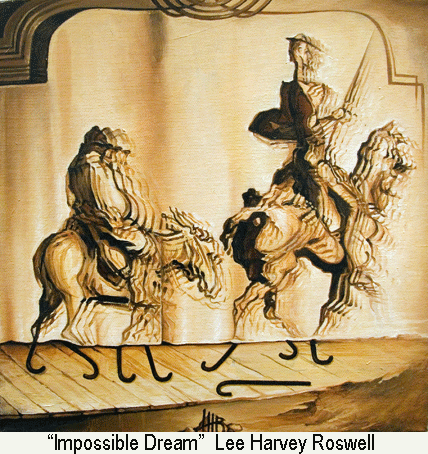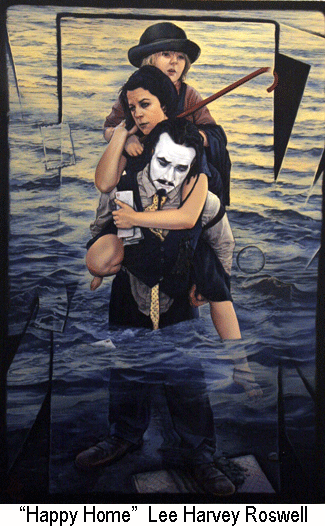Chicago Storefront Theatre Model
If even Slay is not up to the task of summarizing the proposals and calls for change that has had the theatrosphere vibrating over the last few weeks, you know that the conversation is as complex he claims it is.
A couple of times in the past few days I’ve started to write a big summary post of the drama that is currently engulfing most of the theatrenet. For those who don’t know, here are some relevant bits and pieces. Visible Soul, The Mirror Up to Nature, Theatre Ideas, Theatre Ideas, Marsha Norman, An Angry White Guy in Chicago, Rat Sass, Mike Daisey, DevilVet, Jonathan West, The Clyde Fitch Report, Mike Daisey
I often consider it my niche to condense discussions like this for those who haven’t the time or energy to read everything that encompasses such an impassioned, complex look at the state of our art. But, I’m not doing that this time. It seems that what’s needed most here, from us as writers, and you as readers, is engagement. So, please, pick a few of the above, read them throughly and get involved.
Slay’s current post was going to be a follow-up; instead, he found that Don Hall’s inspiring current post with its call for action beat him to the punch on the couple points he had wished to address.
In early December I was visiting family in Chicago so I decided to meet Don Hall in person. I appreciate his built-in bullshit barometer with which he guages observations on theatre and culture at his An Angry White Guy in Chicago site. He also describes his own theatre’s aesthetic and practice there, which parallels much of my history in Chicago back in the early ‘80’s. The original seven founding members of my theatre had all recently graduated from the Chicago Circle Campus of U of I and one was a professor of theatre design there. We followed the model our immediate theatre predecessors in Chicago had established.
The mushrooming growth of homegrown, homemade theater reached its climax in the mid-1970s, with the opening of several small companies that proved training grounds and taking-off points for young directors, actors, designers, and playwrights. These troupes included Victory Gardens, Northlight, Wisdom Bridge, the Body Politic, St. Nicholas (founded by playwright David Mamet), Remains, Organic, and Steppenwolf theaters.
However different their productions, these theaters shared certain key elements. They were founded and staffed by young persons just out of school and eager to find recognition. They were housed in 150- to 250-seat auditoriums in buildings that had never been designed as theater spaces. Warehouses, bowling alleys, ballrooms, church halls, and retail shops were all converted to theater use by the youthful companies who established these revamped spaces as their bases of operations.
Patterns of growth also were similar. Often started with amateur talent and focused on the work of a particular director or writer, the theaters edged into professional status as their audiences and revenue grew. Unlike their counterparts in other cities, however, these companies stayed out of the high-rent downtown districts. Instead of a large theater company in a center-city cluster of high-profile edifices, Chicago offered a swarm of small, enterprising “off-Loop” theaters, many of them in North Side neighborhoods on the fringes of downtown.
From Chicago our theatre moved to Toronto, where the alternative theatre scene was not only thriving in many ways similar to Chicago’s, but was also funded in some part by government grants and actively covered by the mainstream press.We then found another alternative community on NYC’s Lower East Side when we became the first theatre to produce at ABC No Rio. At one point we had members from all three cities’ alternative art communities working together. No Rio of course epitomized the “storefront rebellion” aesthetic in theatre and art that continues today, and although No Rio is probably slightly more radical than most, it intersects with the “tribe model” now being proposed by Scott Walters and others.
ABC No Rio is a collectively-run center for art and activism. We are known internationally as a venue for oppositional culture. ABC No Rio was founded in 1980 by artists committed to political and social engagement and we retain these values to the present.We seek to facilitate cross-pollination between artists and activists. ABC No Rio is a place where people share resources and ideas to impact society, culture, and community. We believe that art and activism should be for everyone, not just the professionals, experts, and cognoscenti. Our dream is a cadres of actively aware artists and artfully aware activists.
Our community is defined by a set of shared values and convictions. It is both a local and international community. It is a community committed to social justice, equality, anti-authoritarianism, autonomous action, collective processes, and to nurturing alternative structures and institutions operating on such principles. Our community includes artists and activists whose work promotes critical analysis and an expanded vision of possibility for our lives and the lives of our neighborhoods, cities, and societies. It includes punks who embrace the Do-It-Yourself ethos, express positive outrage, and reject corporate commercialism. It includes nomads, squatters, fringe dwellers, and those among society’s disenfrachised who find at ABC No Rio a place to be heard and valued.
When I met Don in Chicago last December, he offered me the opportunity to attend the reading of a new play by Bob Fisher and a discussion that his wife Jen was leading. When we arrived at the reading room, I think it was Dan Granata who joked that we should be alert to the fact that some secret conspiratorial cabal might have had a hand in bringing our little section of the theatrical blogosphere into such close physical proximity with one another. Don, Dan, and Bob are each attempting to lead the discussion on theatre models, so I feel very much part of a new national confederacy of theatres that is trying to articulate and manifest itself.
Don’s recent call for a local Chicago rally over The Off Loop Freedom Charter I think should be supported by the kindred community of artists nationally. I have said in the numerous arguments with Scott over his Us/Them rants and identity, often in the comment sections at Theatre Ideas, that most artists inhabit a split identity — half “tribe” and half “Nylachi.”Don has articulated the tribe half of the theatre community, much of which rings true to my experience with organizing theatres in The Rat Conference for ten years.
The fact is, even if you are a theater artist lucky enough to actually make a full-time living wage performing or directing or writing (yeah – the freaking six of you out there), you are still a part of a small, fragmented gypsy tribe. Fringe Dwellers. Squatters. Nomads.
Don also points out a core problem that many of us at rat addressed. We had proposed the radical notion of No More Box Office as a way of de-commodifying our work and our theatre lead in the practice of the “potlatch model” of hosting conferences and producing theatre collectively. Don now calls for the same paradigm shift.
The model that nearly everyone works under treats theater as a thing to be bought and sold. And as we labor under this paradigm, countless talents are buried under the weight of creating communication and art while being burdened with the economics of a commodity that, due to the very nature of the paradigm, is increasingly becoming unsellable except under the most superficial methods.
We’ve all read it. We all know that change is in the air. What the fuck are we going to do about it?
The “do” should be the beginning and end of all our talk. Leonard Jacobs is absolutely right in telling us all to shut up and act. The argument over theatre models needs to function as a galvanizing issue that unites us as the national theatre and tribe that we already are; i.e., as artist bloggers, idea and action should be tied together. So if we propose an idea to peers, we need to be willing to carry it into practice ourselves. We need to keep our dreams grounded in what is achievable.
I am in full support of what Don is organizing in Chicago. I am excited by the lead the theatrosphere in that city is taking in building a rat-like confederacy. And, back to the future, I feel the same hope for theatre as an art form I felt thirty years ago when we first imagined our ensemble into existence.
(Crossposted at International Culture Lab blog.)


